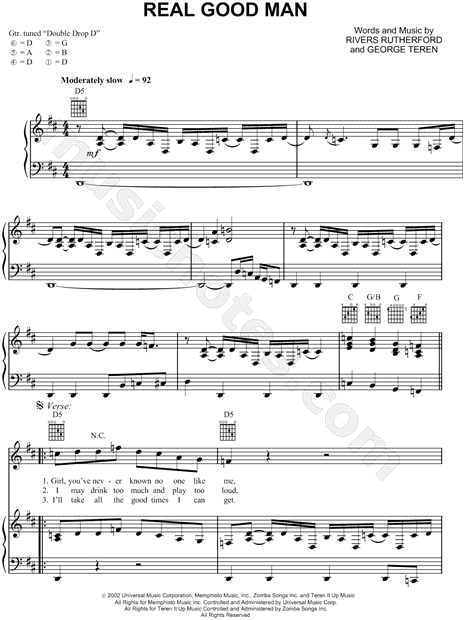
|
Title:
|
Real Good Man |
|
|---|---|---|
|
By:
|
||
|
Instruments:
|
Guitar Piano Voice, range: A3-F#5 | |
|
Scorings:
|
Piano/Vocal/Guitar |
|
|
Original Published Key:
|
D Major |
|
|
Product Type:
|
|
Musicnotes |
|
Product #:
|
MN0044794 |
|
|
Price:
|
$5.99
Includes 1 print + interactive copy with lifetime access in our free apps.
Each additional print is $4.99
|
|
|
Number of Pages:
|
6 |
|
|
Average Rating:
|
Rated 5/5 based on 2 customer ratings |
|
|
Top Review:
|
"my wife likes this song &ilike to to play music mywife likes"
Read reviews
|
|
|
Lyrics Begin:
|
Girl, you've never known no one like me, up there in your high society. |
|
|
By:
|
Tim McGraw |
|
|---|---|---|
|
Number of Pages:
|
6 |
|
|
Form:
|
Song |
|
|
Instruments:
|
Guitar Piano Voice, range: A3-F#5 | |
|
Scoring:
|
Piano/Vocal/Guitar |
|
|
Original Published Key:
|
D Major |
|
|
Product Type:
|
|
Musicnotes |
|
Product #:
|
MN0044794 |
|
|
Tempo:
|
Moderately Slow |
|
|
Metronome:
|
q = 92 |
|
|
Genres:
|
Country-Pop Neo-Traditionalist Country Adult Contemporary Contemporary Country |
|
|
Composers:
|
||
|---|---|---|
|
Lyricists:
|
||
|
Date:
|
2002 |
|
|
Publisher:
|
||
|
Product Type:
|
|
Musicnotes |
|
Product #:
|
MN0044794 |
|
|
Lyrics Begin:
|
Girl, you've never known no one like me, up there in your high society. |
|
|
From the Album:
|
||
|
From the Book:
|
Real Good Man |
|
Musicnotes sells a wide variety of digital sheet music products including Singer Pros, Beginner Notes, Choral music, Piano Solos, Lead Sheets, Piano/Vocal/Guitar, Solo and Accompaniment, and fretted instrument tablature.
You can access your sheet music under ‘My Sheet Music’ on the Musicnotes website, via the free Musicnotes app, by printing it, or by purchasing an optional PDF for use with another app.
Many of the arrangements on Musicnotes have transpositions available, typically in C Major, as well as 3 sharps and 3 flats. If you do not see your desired key, you can request a transposition by reaching out to Customer Support.
Musicnotes Pro is our premium membership program designed to help musicians save more and get the most out of their sheet music experience. With a Pro membership, you'll enjoy benefits like 25% off all sheet music purchases on our website and iOS app, free PDF downloads with every purchase, exclusive discounts on Pro Credits, 10 free Musicnotes Edition files per month, and more. Pro Premium members also receive 12 free Pro Credits annually. It’s the perfect way to enhance your practice, performance, and savings.
About this product